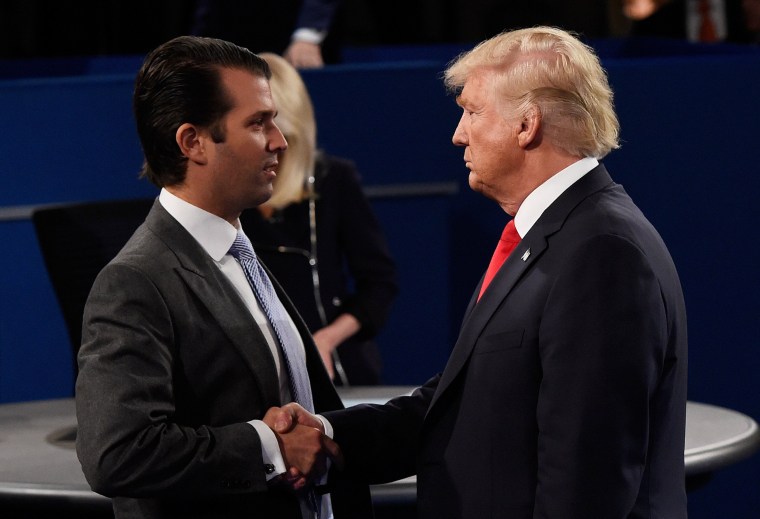Donald Trump Jr. recently told a Congressional committee he could not answer questions about a phone conversation he had with his father, President Donald Trump. Trump Jr. claimed that because attorneys were present on the call he had the right to invoke the attorney-client privilege.
This was not just any father-son chat. Trump Jr. and President Trump were speaking in July 2017, right after his now-infamous meeting in June 2016 became national news. In that 2016 meeting, held at Trump Tower, Trump Jr. allegedly asked a Russian lawyer if they had dirt on Hillary Clinton’s presidential campaign.
But attorney-client privilege is actually much narrower than people, or at least Trump Jr., seems to think.
The privilege was designed to protect certain communications made between the attorney and the client. The point is to allow people to tell their attorneys the real and full story regarding their cases without fear that the information discussed will be disclosed.
However, attorneys are not wizards. Merely having one in the room or on the phone does not automatically make communications subject to the attorney-client privilege. If this were true, then anytime I go out to dinner with friends, everything we say at the table would be privileged.
Attorneys are not wizards. Merely having one in the room does not automatically make communications subject to the attorney-client privilege.
There are basically three requirements that determine whether attorney-client privilege applies. First, there must actually be a communication between a client, or potential client, and an attorney who is acting in his or her capacity as an attorney. The privilege does not include communications between you and your surfing instructor who happens to be a lawyer if your surfing instructor is telling you how to stay on the board. (If he is giving you advice on your land dispute with your neighbor, however, it could apply.)
Keep in mind here that all attorneys are not created equal. Government lawyers, such as White House lawyer Ty Cobb, would be treated differently from personal lawyers, such as Trump’s attorney John Dowd. So we need to know which lawyers were on this call. President Trump and Trump Jr. may not share attorney-client privilege with Cobb, but do with Dowd; Cobb represents the office of the presidency but not the President.
Second, the party’s communication must be intended to be confidential. If you tell your attorney that you just read a wonderful book in book club, you would not be able to keep that opinion secret if subpoenaed, regardless of how embarrassed said statement might make you feel after the fact.
Third, the communication must be made for the purpose of getting or giving legal advice. So there’s nothing to prevent your lawyer from telling everyone about how you secretly love reality television shows, even if you intended for that communication to be private.
But there are exceptions to the rule. For instance, if a client talks about what he said to his attorney, he waives the privilege and cannot later decide to try to keep the information private. If you tell friends how much you paid for a piece of property, in other words, you cannot later tell a lawyer that information and claim it to be confidential. The fact that you had a communication with your lawyer might be confidential, but the underlying information about how much you paid for the property is not.
Attorney-client privilege is actually much narrower than people, or at least Trump Jr., seems to think.
Not surprisingly, if the purpose of the communication is to break the law, privilege does not exist. And with some additional exceptions, the privilege does not exist if the communication was made in the presence of others. In this scenario, something called the “common interest” doctrine may apply. Generally speaking, the doctrine requires that the other person or people present during the disputed conversation share a common legal interest with the client — and that the communications were made to further that interest.
So where does this leave us with respect to Trump Jr.’s invocation of the attorney-client privilege? As lawyers like to say, “it depends.” But it is an understatement to say that Trump Jr. faces serious hurdles.
First, there was a communication between a client and an attorney, but was it the type of attorney with whom both Trump Jr. and Sr. enjoy a relationship that gives rise to an attorney-client privilege? The answer is likely “no” if the White House counsel was the lawyer on the phone.
Second, was the communication intended to be confidential? Trump Jr. faces some questions about who else was on the call and whether or not he and his father share a common legal interest and/or if their interests are actually adverse.
Third, it is not clear that the conversation occurred for the purpose of giving or obtaining legal advice — or if it was simply to talk damage control following the Trump Tower bombshell.
And one last thing: Congress is not the same as a court. Congress does not always respect the assertion of the attorney-client privilege. But, if the Congressional committee (the chair of the committee is Republican Representative Mike Conaway of Texas) insists on obtaining this information, they should subpoena Trump Jr. If Trump Jr. refuses to comply with the subpoena then the chair of the Congressional committee can go to court and try to get a judge to force Trump Jr. to answer.
Therefore the answer to this legal problem requires some amount of political will. As such, there is likely no solution coming.
Jessica A. Levinson is a professor at Loyola Law School, Los Angeles, and is the president of the Los Angeles Ethics Commission.

